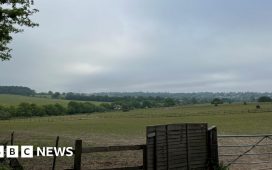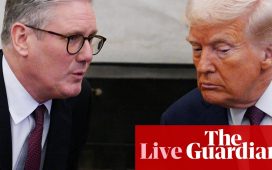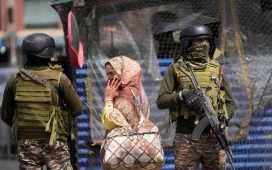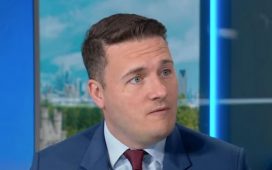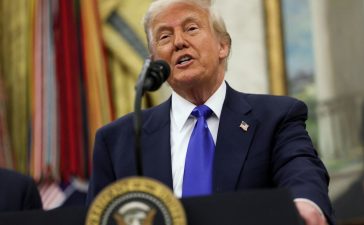Starmer accused by Tories of ‘hiding’ assessment of impact of winter fuel payments cut on pensioners
Here is the PA Media story from PMQs.
Keir Starmer has been accused of “hiding” the impact of the government’s winter fuel payment cuts amid fears the policy will cause an increase in pensioner deaths.
Former prime minister Rishi Sunak highlighted Labour research from 2017 which claimed Conservative plans to scrap the winter fuel payment for better-off pensioners could lead to almost 4,000 additional deaths over winter.
Outgoing Tory leader Sunak asked whether the government believed the numbers are predicted to be higher or lower this year, with Starmer focusing on increases to the state pension when answering in the Commons.
Starmer also used PMQs to urge Sunak to “apologise for the £22bn black hole” that Labour argues was left by the previous Tory administration.
People in England and Wales not in receipt of pension credit or other means-tested benefits will lose out under the government’s changes to winter fuel payments.
It is expected to reduce the number of pensioners in receipt of the up to £300 payment by 10 million, from 11.4 million to 1.5 million, saving more than £1bn this year.
Speaking at PMQs, Sunak urged Starmer to publish the impact assessment for means-tested winter fuel payments.
He said: “We know why he’s hiding the impact assessment. The Labour Party’s own previous analysis claimed that this policy could cause 3,850 deaths. So, are the numbers in his impact assessment higher or lower than that?”
Starmer replied: “We’re taking this decision to stabilise the economy. That means we can commit to the triple lock. By committing to the triple lock we can make sure that payments of state pension are higher and therefore there’s more money in the pockets of pensioners, not withstanding the tough action we need to take.
“But he goes around pretending that everything is fine. That’s the argument he tried in the election and that’s why he’s sitting there and we are sitting here.”
Sunak countered: “Today pensioners watching will have seen that the prime minister has repeatedly refused to admit or publish the consequences of his decision and we will continue holding him to account for that.”
Earlier in the pair’s exchanges, Starmer outlined his justification for the decision.
He said: “The fact of the matter is this: they left a £22bn black hole and they hid it from the OBR [Office for Budget Responsibility]. Richard Hughes is absolutely clear, the largest year-ahead overspend outside the pandemic.”
The prime minister said increases in pensions “will outstrip any loss of payment” as a result of the triple lock, which guarantees the state pension will rise by inflation, average wage growth or 2.5%.
The full state pension is set to rise by £460 from next April, according to official wage figures released this week.
Key events
The Ministry of Housing, Communities and Local Government has published a lengthy guide to the renters’ rights bill, which is being published today.
In a news release about it, Angela Rayner, the deputy PM and housing secretary, says:
Renters have been let down for too long and too many are stuck in disgraceful conditions, powerless to act because of the threat of a retaliatory eviction hanging over them.
Most landlords act in a responsible way but a small number of unscrupulous ones are tarnishing the reputation of the whole sector by making the most of the housing crisis and forcing tenants into bidding wars.
There can be no more dither and delay. We must overhaul renting and rebalance the relationship between tenant and landlord. This bill will do just that and tenants can be reassured this government will protect them.
Hilary Benn announces public inquiry into murder of Patrick Finucane
Here is the full text of the Commons statement from Hilary Benn, the Northern Ireland secretary, announcing a public inquiry into the murder of Pat Finucane.
This government takes its human rights obligations – and its responsibilities to victims and survivors of the Troubles – extremely seriously.
And the plain fact is that two decades on, the commitment made by the government – first in the agreement with the Irish government, and then to this House – to establish an inquiry into the death of Mr Finucane remains unfulfilled.
It is for this exceptional reason that I have decided to establish an independent inquiry into the death of Patrick Finucane under the 2005 Inquiries Act …
In making this decision, I have, as is required, considered the likely costs and impact on the public finances. It is the Government’s expectation that the inquiry will – while doing everything that is required to discharge the State’s human rights obligations – avoid unnecessary costs given all the previous reviews and investigations, and the large amount of information and material that is already in the public domain.
John Finucane, Pat’s son, who is a Sinn Féin MP, welcomed the news in a statement on social media.
Today is for my father, Pat Finucane.
The announcement that there will now be a public inquiry into his murder is very much welcomed by our family.
Led by my mother Geraldine, we have campaigned for decades to uncover the truth behind my father’s murder.
I want to thank… pic.twitter.com/NWl3ikaSF6
— John Finucane MP (@johnfinucane) September 11, 2024
The Irish government also welcomed the news. This is from Micheál Martin, the tánaiste (deputy PM).
I welcome the decision to establish an independent public inquiry into the murder of Pat Finucane.
This case matters, first and foremost, to the Finucane family.
It also matters to those, on all sides, working for justice in Northern Ireland. pic.twitter.com/WJAJZGbT9K
— Micheál Martin (@MichealMartinTD) September 11, 2024
Reeves says government won’t cut free bus passes, prescriptions and TV licences currently available for pensioners
At one point during PMQs Keir Starmer refused to guarantee that the government would keep concessionary bus passes for pensioners. (See 12.32pm.)
But in her GB News interview this morning, Rachel Reeves, the chancellor, did commit to keeping bus passes for pensioners. Asked if the government was going to “cut back on bus passes”, and if the budget in October would be worse than expected, Reeves replied:
We’ve committed to those bus passes, to free TV licenses for those entitled, and free prescriptions.
Pensioners only get free TV licences if they are 75 or over and on pension credit.
At its post-PMQs lobby briefing Downing Street refused to say if the government would be publishing an impact assessment into the winter fuel payments cut. A spokesperson said:
Ministers will receive advice on the development of all policies but we don’t routinely provide a running commentary on the advice that they receive.
We have spoken to the necessity of setting out the plans promptly, given the need to lay the regulations to come into effect in September.
But earlier this week Miatta Fahnbulleh, an energy minister, told John McDonnell, in a parliamentary written answer that figures would be published in due course showing how many extra people were in fuel poverty as a result of the policy. She said:
A statistical publication estimating the rate of fuel poverty for those in receipt of winter fuel payment in 2023, and the proportion of households who would be in fuel poverty under new eligibility criteria, will be published in due course.
Reynolds admits deal with Tata Steel over better terms for workers facing redundancy ‘falls short of my ideal’
Jonathan Reynolds, the business secretary, has told MPs that the deal the government has agreed with Tata Steel, linking a £500m government investment in a new electric furnace at the Port Talbot plant with improved terms for workers who are losing their jobs due to the closure of the last blast furnace, “falls short of what would be my ideal”.
In a statement to MPs, he said:
Since becoming the secretary of state two months ago, I’ve had to respond to a series of challenges not just with the steel industry, but also in shipping, such as Harland & Wolff, and in other areas where the previous government had simply ceased to make decisions and decided to leave them for us to deal with.
This was a dereliction of duty and it has left the steel industry in particular in an extremely perilous position.
The last government had been promising a plan for the steel industry for years. With what I’m able to announce today, with the signing of a legally-binding deal that enables Tata to order their electric arc furnace as part of a significantly improved package, this government has made more progress in two months than they made over the last parliament.
But even if we had started these negotiations a year ago, never mind many years ago as they had the opportunity to do, I have no doubt we would have secured an even better deal for the community, so I would like to start with an apology to the people of Port Talbot because they were let down by the previous government.
Whilst this deal is much improved, I acknowledge very much it falls short of what would be my ideal.
Details of the deal are here, in the Department for Business and Trade’s news release.
Urkainian PM asks David Lammy for UK support in allowing Kyiv to use long-range missile to hit Russian territory
Denys Shmyhal, the Ukrainian prime minister, has asked the UK for “help and support” in using long-range missiles to strike Russian territory, PA Media reports. PA says:
David Lammy and his US counterpart Antony Blinken are on a joint visit to the Ukrainian capital to show support for Kyiv.
Ukraine’s president Volodymyr Zelensky has repeatedly pushed for permission to use Western missiles to strike at targets within Vladimir Putin’s Russia, and US President Joe Biden and Keir Starmer are set to discuss the issue in Washington on Friday.
Speaking at the start of a meeting with Lammy at his office in Kyiv on Wednesday, Shmyhal said: “We hope that long-range equipment for strikes on the territory of our enemy will be reached and we will have it. And we hope for your help and support in this issue.”
Lammy and Blinken took an overnight train from eastern Poland and reached the Ukrainian capital at 11.45am local time.
Lammy hailed the Kyiv trip as “the first of its kind in a decade” at a press conference alongside his US counterpart on Tuesday, while Blinken said: “One of the purposes of the trip we will be taking together is to hear directly from the Ukrainian leadership including … President Zelensky about exactly how the Ukrainians see their needs in this moment, toward what objectives and what we can do to support those needs.
“All I can tell you is we will be listening intently to our Ukrainian partners, we will both be reporting back to the prime minister, to President Biden in the coming days, and I fully anticipate this is something they will take up when they meet on Friday.”
Photograph: Leon Neal/AP
Hilary Benn, the Northern Ireland secretary, has just told MPs he is ordering a public inquiry into the murder of Patrick Finucane.
Starmer accused by Tories of ‘hiding’ assessment of impact of winter fuel payments cut on pensioners
Here is the PA Media story from PMQs.
Keir Starmer has been accused of “hiding” the impact of the government’s winter fuel payment cuts amid fears the policy will cause an increase in pensioner deaths.
Former prime minister Rishi Sunak highlighted Labour research from 2017 which claimed Conservative plans to scrap the winter fuel payment for better-off pensioners could lead to almost 4,000 additional deaths over winter.
Outgoing Tory leader Sunak asked whether the government believed the numbers are predicted to be higher or lower this year, with Starmer focusing on increases to the state pension when answering in the Commons.
Starmer also used PMQs to urge Sunak to “apologise for the £22bn black hole” that Labour argues was left by the previous Tory administration.
People in England and Wales not in receipt of pension credit or other means-tested benefits will lose out under the government’s changes to winter fuel payments.
It is expected to reduce the number of pensioners in receipt of the up to £300 payment by 10 million, from 11.4 million to 1.5 million, saving more than £1bn this year.
Speaking at PMQs, Sunak urged Starmer to publish the impact assessment for means-tested winter fuel payments.
He said: “We know why he’s hiding the impact assessment. The Labour Party’s own previous analysis claimed that this policy could cause 3,850 deaths. So, are the numbers in his impact assessment higher or lower than that?”
Starmer replied: “We’re taking this decision to stabilise the economy. That means we can commit to the triple lock. By committing to the triple lock we can make sure that payments of state pension are higher and therefore there’s more money in the pockets of pensioners, not withstanding the tough action we need to take.
“But he goes around pretending that everything is fine. That’s the argument he tried in the election and that’s why he’s sitting there and we are sitting here.”
Sunak countered: “Today pensioners watching will have seen that the prime minister has repeatedly refused to admit or publish the consequences of his decision and we will continue holding him to account for that.”
Earlier in the pair’s exchanges, Starmer outlined his justification for the decision.
He said: “The fact of the matter is this: they left a £22bn black hole and they hid it from the OBR [Office for Budget Responsibility]. Richard Hughes is absolutely clear, the largest year-ahead overspend outside the pandemic.”
The prime minister said increases in pensions “will outstrip any loss of payment” as a result of the triple lock, which guarantees the state pension will rise by inflation, average wage growth or 2.5%.
The full state pension is set to rise by £460 from next April, according to official wage figures released this week.
PMQs – snap verdict
How long can get away with Labour get away with blaming the Tories for everything being a mess? Months? Years? A whole parliament? A decade? Until the end of time
Experience suggests that, once a party acquires a reputation (rightly or wrongly) for having ruined the country, it takes a very long time to recover. Black Wednesday was a talking point for years, George Osborne’s (false) claim that Gordon Brown was largely to blame for the financial crash helped lift the Tories for the best part of a decade, and until relatively recently the “winter of discontent” was still a memory with some resonance for older voters.
At PMQs today Keir Starmer was relying very heavily on the ‘Tory catastophe inheritance’ argument as a counter to more or less every complaint about government performance. Largely it worked, and that mostly that’s because what he said about the legacy he was left was true. If you were getting bored of PMQs towards the end, then bad news; it’s going to be like this for the foreseeble future.
Over time the argument will become less powerful, but it will also get neutralised when Starmer finds himself up against a Tory leader willing to admit the last government mucked up in many areas. Judging by what the candidates are saying in the current leadership party, that moment won’t come for some while.
Rishi Sunak was most effective at PMQs when pressing Starmer if he would publish the impact assessement about the winter fuel cut, and whether it will confirm an earlier Labour assessment that 4,000 pensioners might die as a result. There is a defence, of sorts, that could be made: the 4,000 deaths figure seems to be based on the assumption that all pensioners would lose the winter fuel payments (the government will still pay it to the poorest pensioners, who will need it most) and it ignores other mitigation payments in place. But it would have been disastrous if Starmer had tried to engage in this argument, and instead he just ignored the question. It is better to look evasive than to look like a PM willing to debate how many pensioner deaths a year might be acceptable.
Sunak represents a rural constituency, and he devoted his last three questions to farming. This helped Starmer, because a full six questions on the winter fuel payments would have been worse.
Overall, Starmer was fine. But it wasn’t a triumph, and Starmer came over as someone who was not that bothered about making it one. Does he spend as much time preparing for PMQs as some of his predecessors? David Cameron, for example, gave the impression of being a PM for whom a witty, brilliant performance at PMQs was the highlight of the week. Starmer looks like someone who just wants to get it all over and done with, so that he can get back to chairing a meeting about his government missions.
Olly Grover (Lib Dem) asks about a new rail service for his Didcot and Wantage constituency.
Starmer says he will ensure Grover gets a meeting with a minister to discuss this.
Jessica Morden (Lab) asks about support for the steel industry.
Starmer says it is vital to have steel made in this country, and in the future the governemnt will need more, not less. In the transition, it is vital jobs are protected, he says.
Ann Davies (Plaid Cymru) says the Welsh government is trying to place all new power cables underground. But the UK government wants them overground. Why?
Starmer says the government is committed to the transition to renewable energy, but it has to be done in a cost-effective way, he says.
Louie French (Con) asks if Starmer will rule out scrapping concessionary bus passes for pensioners and council tax discounts.
Starmer says he will not pre-empt the budget.
Starmer says he will have a lot more to say about cancer treatment tomorrow when he responds to the Darzi report on the NHS.
Harriet Baldwin (Con) says she thought socialism was about taxing those with the broadest shoulders to help the poorest. Instead “Starmer socialism” is about scaring the richest people out of the country, and penalising the poor.
Starmer says his priority is stabilising the economy, because when the government loses control, the poorest people suffer.


